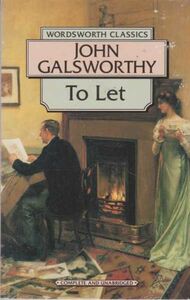You need to sign in or sign up before continuing.
Take a photo of a barcode or cover
I didn't like this one quite so much as the preceding two. Galsworthy follows the same formula as in the first two books - the tragedy of an unsuitable relationship, and how it can damage an entire family - with an added Romeo and Juliet style twist. However, I never really came to feel for Fleur and Jon the way I did for the characters of the preceding generations of Forsytes. Soames, Irene, and Young Jolyon still continued to be the characters I wanted to see more of. Still the same rambling, elegant Victorian-stye prose that I love, though.
I don't know if I would particularly recommend this as a book on its own; still, as a part of the series as a whole, its probably a good idea to read it, if only because it rounds out the characters' stories for you to a large extent.
I don't know if I would particularly recommend this as a book on its own; still, as a part of the series as a whole, its probably a good idea to read it, if only because it rounds out the characters' stories for you to a large extent.
Listened to the librivox audio book version, there were some great readers and most conveyed the droll tone of the book better than I would have in my head if I just read it.
Calificación: 4.11/5
De toda la saga este es el libro que me parece más reflexivo/filosófico. Los hechos giran entre un romance entre Fleur, hija de Soames y Anette, y Jon, hijo de Irene y Joylon. A mis ojos es bastante "irónico" y hasta podría calificarlos de Karma. A los amantes los persigue la sombra de un pasado que desconocen y que su familia lucha por ocultar. Como telón de fondo está la Europa del periodo entre guerras, aún frescas las heridas de la entonces llamada "Gran Guerra", pero aún lejos de imaginarse que habría una segunda. Trata mucho sobre el cambio y relajamiento de costumbres, un poco la liberalización de la juventud, e incluso ciertas menciones al comunismo y socialismo. En el caso de los personajes más viejos se encuentran reflexiones más profundas sobre la vida y la muerte, y siento que hacen paralelismos con la muerte de los viejos con la muerte de una era.
De toda la saga este es el libro que me parece más reflexivo/filosófico. Los hechos giran entre un romance entre Fleur, hija de Soames y Anette, y Jon, hijo de Irene y Joylon. A mis ojos es bastante "irónico" y hasta podría calificarlos de Karma. A los amantes los persigue la sombra de un pasado que desconocen y que su familia lucha por ocultar. Como telón de fondo está la Europa del periodo entre guerras, aún frescas las heridas de la entonces llamada "Gran Guerra", pero aún lejos de imaginarse que habría una segunda. Trata mucho sobre el cambio y relajamiento de costumbres, un poco la liberalización de la juventud, e incluso ciertas menciones al comunismo y socialismo. En el caso de los personajes más viejos se encuentran reflexiones más profundas sobre la vida y la muerte, y siento que hacen paralelismos con la muerte de los viejos con la muerte de una era.
emotional
reflective
sad
tense
slow-paced
Plot or Character Driven:
Character
Strong character development:
Yes
Loveable characters:
Complicated
Diverse cast of characters:
Yes
Flaws of characters a main focus:
Yes
“Soames came nearer than he had ever been to a realisation of that truth- passing understanding of a Forsyte pure- that the body of Beauty has a spiritual essence, uncapturable save by a devotion which thinks not of self.”
What an ending to this magnificent trilogy. I can’t say much without spoiling the rest of the book, but I spent almost two months reading The Forsyte Saga and it was SO worth it. Galsworthy has a way of writing that is intoxicating and just downright masterful. I will pick up the next Forsyte trilogy at some point, but I need this to soak in for a while first. Definitely the best Victorian/post-Victorian family saga I’ve ever read.
What an ending to this magnificent trilogy. I can’t say much without spoiling the rest of the book, but I spent almost two months reading The Forsyte Saga and it was SO worth it. Galsworthy has a way of writing that is intoxicating and just downright masterful. I will pick up the next Forsyte trilogy at some point, but I need this to soak in for a while first. Definitely the best Victorian/post-Victorian family saga I’ve ever read.
reflective
slow-paced
Plot or Character Driven:
Character
Strong character development:
Yes
Loveable characters:
Complicated
Diverse cast of characters:
No
Flaws of characters a main focus:
Yes
True classics don't really age, and while the setting and problems are old, the language and the characters remain as fresh.
emotional
informative
reflective
medium-paced
Plot or Character Driven:
A mix
Strong character development:
Yes
Loveable characters:
Yes
Diverse cast of characters:
Yes
Flaws of characters a main focus:
Yes
challenging
dark
emotional
reflective
sad
tense
medium-paced
This was the best of the three! I loved the main stroyline and there were less "boring" parts than in the other two, by "boring" parts i mean the long meandering thought passages, which are fine, but can be a bit much. I somehow came to be fond of Soames! How! I think Irene and Jon's relationship all in all was kind of sweet but the interlude kind of made it really Oedipus like...
It was beautifully written. And how i love Michael, he is such a breath of fresh air, funny, and says what he want. I find him a stark contrast to the more conservative Forsytes. Great book, Forsyte at its best.
It was beautifully written. And how i love Michael, he is such a breath of fresh air, funny, and says what he want. I find him a stark contrast to the more conservative Forsytes. Great book, Forsyte at its best.
reflective
sad
slow-paced
Plot or Character Driven:
A mix
Strong character development:
Complicated
Loveable characters:
Complicated
Diverse cast of characters:
No
Flaws of characters a main focus:
Yes
While I'm aware the series goes on--I'm only reading these because I got the sixth book from a subscription box--the end of this work is clearly the end of a trilogy, a story, and even an era.
Without spoiling any of the actual plot (because if you're interested in reading this at all, knowing what happens would ruin the soap-opera-saga aspect) I'm again inclined to examine how feminist, or not, this book is. In my review of the first novel I spoke of the disdain Galsworthy seemed to have for the British middle class and their strict notions of property, including believing women were property, and found a great deal of satire in his depiction of this sprawling family. In my review of the second, I was a little disappointed that the structure of the plot treated Irene as an object even while purporting that her agency and happiness were important.
Here, I feel we've bounced back to something very close to modern feminism in terms of the Soames/Irene schism. When I skimmed some reviews of the first book before I started, there were readers who were discussing whether they were Team Soames or Team Irene, basically, even if they never used those terms. By this point, though, I would view someone who joins Team Soames as unironically declaring themselves to be a garbage human being who believes they have the right to own other people. The narrative spends a great deal of time with Soames and shows his deepest character without reservation, but only someone who can't understand subtext would believe the author condones his behavior, and the ending supports this, as the specter of what Soames did to Irene haunts their respective children.
I thought overlaying a tale of star-crossed lovers with the end of the tale of the older generation was an interesting way to lead the story forward; and while their love affair is far less concerned about whether women are property or not--Jon never once thinks of Fleur in that context--it was fascinating to read it unfold genuinely not knowing whether, but gradually growing to suspect that, they could not outrun the consequences of their parents' actions.
If I have any criticism of this, it's that the constant old-person haranguing of youth and newfangled technology was dull and tired, even if it was in character for the person espousing it. I hated that attitude when I was a child and teenager, hearing it from my elders. Now that I'm in my forties, I'm consciously making an effort not to fall into the same "the kids these days" way of thinking. It helps that I genuinely don't believe things were better then than they are now--I wouldn't trade the social progress or the technology I have access to for some imagined rosy nostalgia about the 1980s, because so little about the 1980s was good except the music!
Without spoiling any of the actual plot (because if you're interested in reading this at all, knowing what happens would ruin the soap-opera-saga aspect) I'm again inclined to examine how feminist, or not, this book is. In my review of the first novel I spoke of the disdain Galsworthy seemed to have for the British middle class and their strict notions of property, including believing women were property, and found a great deal of satire in his depiction of this sprawling family. In my review of the second, I was a little disappointed that the structure of the plot treated Irene as an object even while purporting that her agency and happiness were important.
Here, I feel we've bounced back to something very close to modern feminism in terms of the Soames/Irene schism. When I skimmed some reviews of the first book before I started, there were readers who were discussing whether they were Team Soames or Team Irene, basically, even if they never used those terms. By this point, though, I would view someone who joins Team Soames as unironically declaring themselves to be a garbage human being who believes they have the right to own other people. The narrative spends a great deal of time with Soames and shows his deepest character without reservation, but only someone who can't understand subtext would believe the author condones his behavior, and the ending supports this, as the specter of what Soames did to Irene haunts their respective children.
I thought overlaying a tale of star-crossed lovers with the end of the tale of the older generation was an interesting way to lead the story forward; and while their love affair is far less concerned about whether women are property or not--Jon never once thinks of Fleur in that context--it was fascinating to read it unfold genuinely not knowing whether, but gradually growing to suspect that, they could not outrun the consequences of their parents' actions.
If I have any criticism of this, it's that the constant old-person haranguing of youth and newfangled technology was dull and tired, even if it was in character for the person espousing it. I hated that attitude when I was a child and teenager, hearing it from my elders. Now that I'm in my forties, I'm consciously making an effort not to fall into the same "the kids these days" way of thinking. It helps that I genuinely don't believe things were better then than they are now--I wouldn't trade the social progress or the technology I have access to for some imagined rosy nostalgia about the 1980s, because so little about the 1980s was good except the music!


